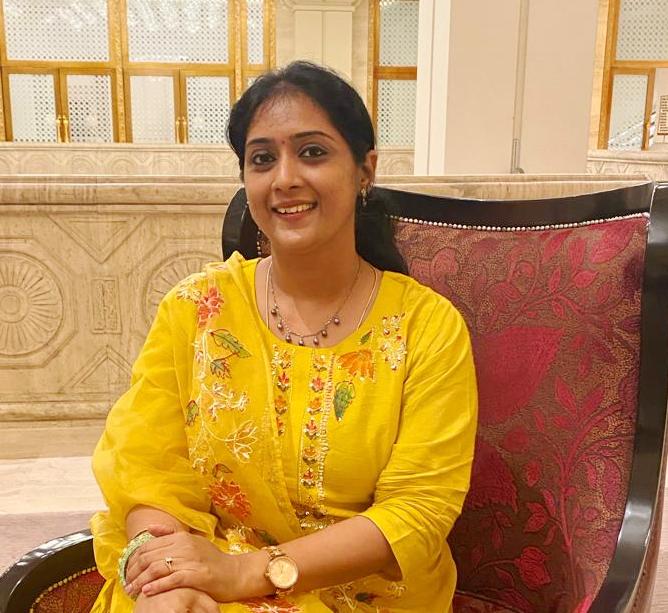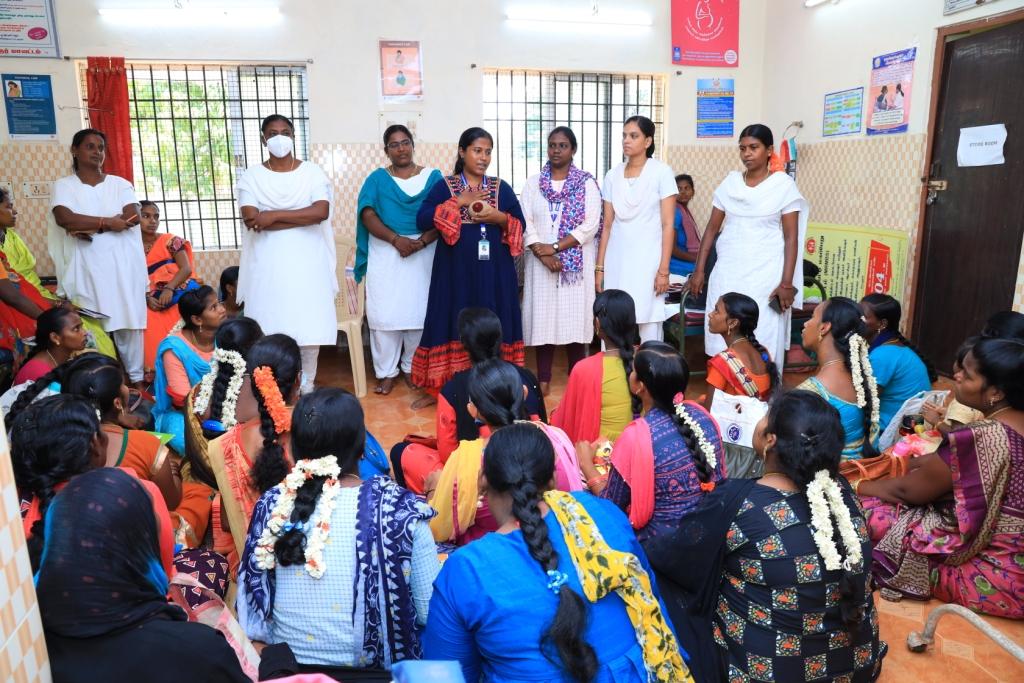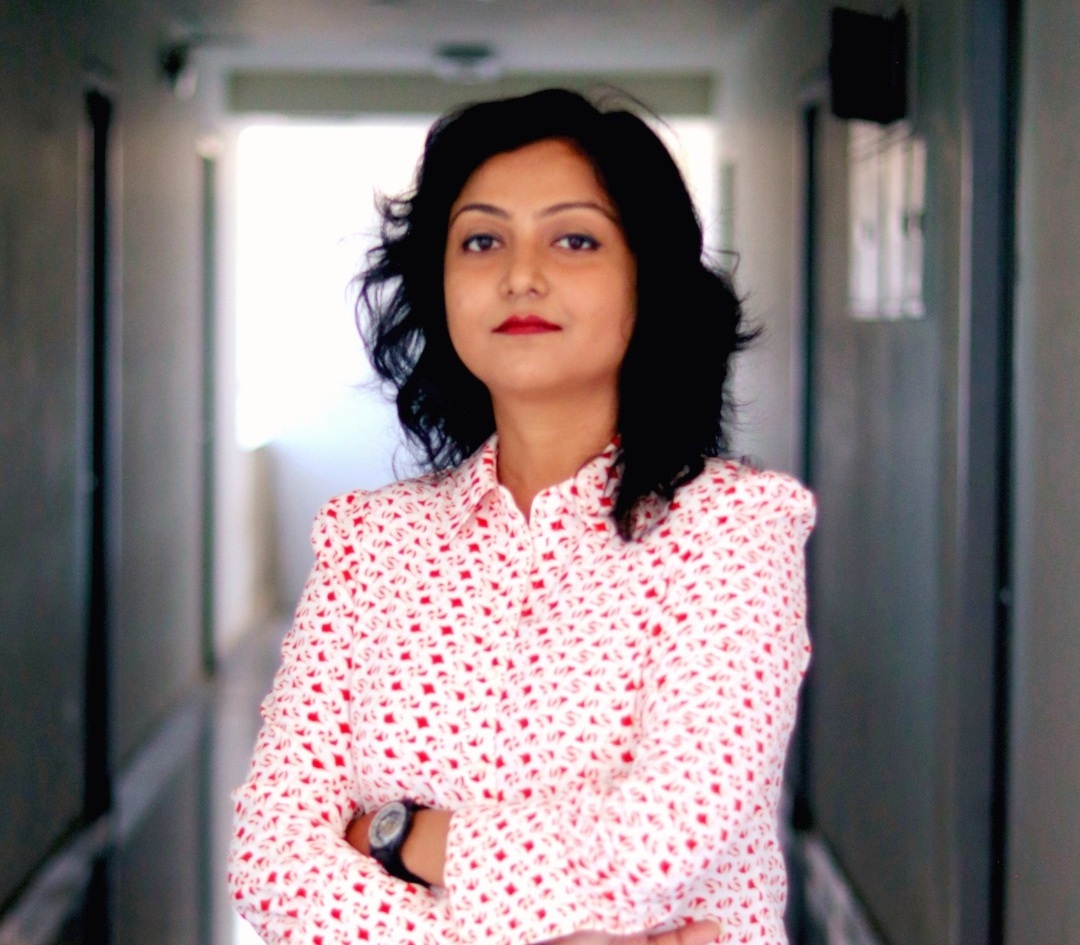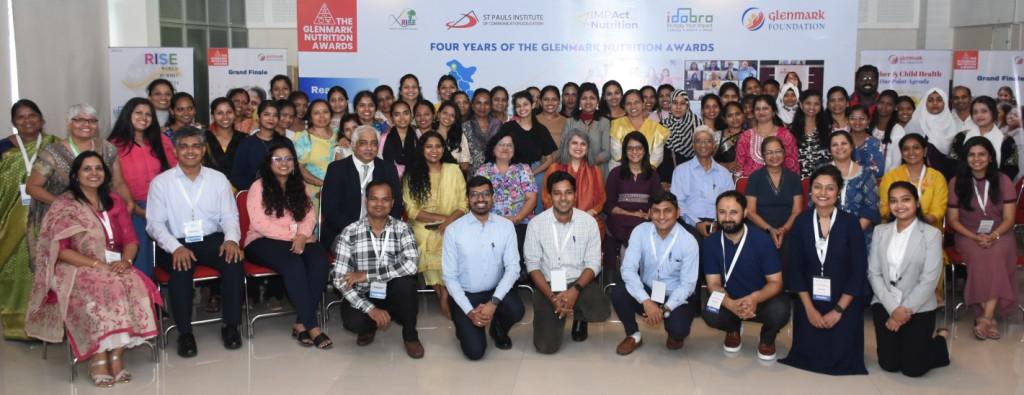Glenmark Foundation, the CSR arm of Glenmark Pharmaceuticals Ltd., recently announced the conclusion of the fourth edition of the Glenmark Nutrition Awards. With a focus on recognizing organizations combatting malnutrition in aspirational districts of India, the awards witnessed over 300 entries from over 110 districts of the country.
In this joint interview with TheCSRUniverse, this year’s winners take us through their transformational work in the domain of health in general and malnutrition in particular. Ms. Subhashree Rajan, Vice President, Partnerships, Ekam Foundation, discusses their work towards ensuring quality healthcare and holistic wellbeing for underprivileged mothers and children in India. Ms. Romita Ghosh, Founder, RevolutionAlze Pvt. Ltd. introduces us to their innovative AI solution MAAP (Malnutrition Assessment and Action Plan) and how is it enabling a comprehensive approach to assess, monitor, and address malnutrition among children. Both organisations discuss their plans with respect to utilizing the grant and how their work will unfold in the near future.
The interview also includes the perspective of Glenmark on addressing malnutrition, the awards and the integral roles played by Idobro and Impact4Nutrition in organizing the same. Finally we touch upon major initiatives taken by Glenmark in the domain of health and nutrition and the impact made thus far.
Scroll down to read the full interview:
 Ekam Foundation (Winner- NGO Category)
Ekam Foundation (Winner- NGO Category)
Ms. Subhashree Rajan, Vice President, Partnerships
Q. Please shed some light on Ekam Foundation's work to ensure quality healthcare for underprivileged children and mothers in India? Are there any particular gaps that you focus your efforts on?
A. Since the past 14 years, Ekam has been actively working towards ensuring quality healthcare for underprivileged children and mothers in India, as well as facilitating their holistic well-being. Our interventions are tailored to address the challenges and gaps within the RMNCAH+N (Reproductive, Maternal, Newborn, Child, Adolescent Health and Nutrition) space by collaborating with government, private, civil societies and communities.
To make quality healthcare accessible to mothers and children so that they not only survive but thrive too we adopt a dual strategy of strengthening the facility and community.
Under Health System Strengthening we focus on strengthening the maternal and child healthcare in the Medical College Hospital, District Hospitals, PHCs by understanding the key gaps in:
- Critical/life-saving equipmentfor mothers and newborns in the Special Newborn Care Units (SNCU), Labour rooms and PHC
- Equipment functionality (particularly in SNCUs)
- Infrastructure facilitating respectful maternity care (Labour room), promoting wellness and family-centric care for sick newborns (mNICU, KMC ward, milk bank)
- Knowledge and skill set of the Nurses
- Technical human resourceessential to ensuring survival of sick Newborn (such as SNCU staff) and promotive health such as lactation counselor.
 Under Community Strengthening we understand the key gaps in:
Under Community Strengthening we understand the key gaps in:
- Knowledge, attitude and practice of key maternal and child healthcare amongst the community
- Awareness and accessing Government maternity benefit schemes and services
- Maternal and child health service provision and quality of services.
- Training requirements of the Frontline Workers
- Convergence amongst the key stakeholders
- Functionality and community participation in health committees, monitoring mechanisms such as VHSNC, MAS, etc.
Q. Could you share some insights into the preventive interventions that you have undertaken to improve maternal and child health? What has the outcome been like?
A. Ekam’s key preventive interventions to improve maternal and child health and their outcomes:
- Operationalized Special Newborn Care Units (SNCU) and Newborn Stabilization Units (NBSU) in Tamil Nadu and Chhattisgarh
--72 SNCUs in Tamil Nadu, 23 SNCU & 153 NBSU in Chhattisgarh through Technical Human Resource Support of around 3000 Nurses
- Strengthened the SNCUs, PHCs, Medical College Hospital, District Hospitals across Tamil Nadu with critical equipment provision
- Increased operation time of critical newborn life-saving equipment at the SNCUs in Tamil Nadu and Chhattisgarh to 98%
- 212 Mentor Nurses trained and placed across the Tamil Nadu state improving quality of MCH care
- 4000+ health professionals trained in maternal and child healthcare in Tamil Nadu and Chhattisgarh
- Microbial Surveillance in 13 SNCUs of Chhattisgarh provided critical information to control antimicrobial resistance and refine the treatment
- Ekam’s Community-Owned Health Model is being implemented across the districts of Tamil Nadu where 300+ local community members have been identified and are being trained and mentored to become Health champions
- Innovative Behaviour Change Communication materials on ‘The First 1000 Days’ developed by Ekam include lactation game, Lakshmi Animoji character, Anaemia and ANC self-monitoring tools, The First 1000 days deck card toolkit, MCH job-aids and training modules are being used by the community workers and Frontline Workers in Tamil Nadu
- Over the last 6 years 11,238 Nutri-gardens were set in Public facilities of Anganwadi Centers, Government Schools and Public Health Centers. In 2022-23, 75 Nutri-gardens set up in Anganwadi Centers, Govt. Schools made sustained nutrition accessible to around 5000 children
- 8,100+ Pregnant women and mothers educated on breastfeeding by Lactation counselors
- 39,000 beneficiaries including pregnant women, lactating mothers and their family members, SHG members sensitized on mother-child healthcare
Q. How will the grant have received from the Glenmark Nutrition Award support Ekam Foundation in furthering its mission?
A. Ekam's holistic approach aims to address maternal and child malnutrition at various levels, from promoting early and essential care for infants to educating communities on nutrition and sustainable practices. Our primary aim is not to replace but to seamlessly supplement the Public health care system.
The grant received on ‘Nutrition SBCC during the First 1000 Days’ for the Aspirational District Virudhunagar of Tamil Nadu will support Ekam to strengthen the Public Systems that have been central to delivery of the nutrition interventions across the First 1000 days: The Integrated Child Development Services through their Anganwadi Workers along with National Health Mission through their Village Health Nurse (VHN) and Auxiliary Nurse Midwives (ANM). The grant will aid in creating First 1000 days Nutrition SBCC tools that are innovative and participative by using the SBCC media approaches, game design elements and principles.
These SBCC messaging tools will enable the Frontline Workers to combat malnutrition and impact adoption of the critical nutrition behavior during the First 1000 days across the following:
3 Key Areas of Nutrition Behavior during the First 1000 days
- Dietary practices during pregnancy & lactation
- Breastfeeding practices
- Complementary feeding practices
2 Cross-cutting High-impact Areas on Nutrition
- Control and prevention of anemia
- WASH-related behaviors
The grant will thus, positively catalyze Ekam’s contribution towards achieving the Sustainable Development Goals particularly: SDG 3 (Good Health and well-being), SDG 2 (Zero Hunger) and SDG 17 (Partnerships).
 RevolutionAlze Pvt. Ltd. (Winner- Open Category)
RevolutionAlze Pvt. Ltd. (Winner- Open Category)
Ms. Romita Ghosh, Founder
Q. What inspired you to develop an AI solution for addressing malnutrition? Can you explain how your solution- MAAP (Malnutrition Assessment and Action Plan)- helps in strengthening child nutrition?
A. The inspiration behind developing our AI solution, MAAP (Malnutrition Assessment and Action Plan), stemmed from the critical need to address the challenges faced by healthcare workers in rural areas due to limited resources. Witnessing firsthand the struggles of healthcare workers in maintaining accurate records of children and facing difficulties in monitoring schemes due to family unavailability or non-compliance, we recognized the urgent need for a more efficient and effective solution.
MAAP (Malnutrition Assessment and Action Plan) plays a pivotal role in strengthening child nutrition by offering a comprehensive approach to assess, monitor, and address malnutrition among children.
- Accurate Assessment: MAAP utilizes advanced AI technology to accurately assess the nutritional status of children. By analyzing various indicators such as height, weight, and growth patterns, MAAP provides healthcare workers with precise data to identify malnutrition at an early stage
- Timely Intervention: With MAAP, healthcare workers can promptly identify children at risk of malnutrition and implement timely interventions. By tracking growth trends and nutritional status over time, MAAP enables healthcare providers to initiate appropriate action plans tailored to the specific needs of each child
- Personalized Action Plans: MAAP generates personalized action plans based on the nutritional needs and health status of individual children. These action plans may include dietary recommendations, nutritional supplements, and referrals to healthcare facilities for further evaluation and treatment
- Data-Driven Decision-Making: MAAP facilitates data-driven decision-making by providing healthcare workers with real-time insights into the nutritional status of children in their care. By analyzing trends and patterns in nutritional data, healthcare providers can make informed decisions to optimize nutrition interventions and improve outcomes
Q. How will the grant received from the Glenmark Nutrition Award help you in implementing Nutrition Tracking and Monitoring initiatives in MP?
A. The grant received from the Glenmark Nutrition Award will play a crucial role in advancing our Nutrition Tracking and Monitoring initiatives in MP, particularly in the Khalwa block of Khandwa district. This funding will enable us to continue our mission of addressing the root causes of malnutrition and providing timely assistance to vulnerable children in the region
- With the support of this grant, we will be able to further develop and deploy our advanced technology, which includes tools for tracking and monitoring the health of children from their homes. This innovative approach allows for proactive intervention and personalized care, ensuring that children receive the support they need to thrive. Additionally, the grant will facilitate the expansion of our outreach efforts, allowing us to reach more families and communities in need
Q. How do you envision the engagement of tech startups with other stakeholders in the healthcare ecosystem impacting the fight against malnutrition in India?
A. The engagement of tech startups with other stakeholders in the healthcare ecosystem has the potential to significantly impact the fight against malnutrition in India in several ways:
- Innovative Solutions: Tech startups bring fresh perspectives and innovative solutions to the table, leveraging technology to address complex healthcare challenges. By collaborating with other stakeholders such as government agencies, NGOs, healthcare providers, and researchers, these startups can develop and deploy novel tools and interventions to combat malnutrition more effectively
- Data-driven Insights: Tech startups often harness the power of data analytics and artificial intelligence to generate actionable insights. By analyzing large datasets related to nutrition, health outcomes, and socioeconomic factors, these startups can identify patterns, trends, and areas of need. This data-driven approach enables stakeholders to make informed decisions and allocate resources more efficiently to address malnutrition at both individual and population levels
- Scalable Solutions: Many tech startups focus on developing scalable solutions that can reach large numbers of people across diverse geographic areas. By leveraging digital platforms, mobile apps, and telemedicine technologies, these startups can deliver nutrition interventions, education, and support services to remote and underserved communities where traditional healthcare infrastructure may be lacking
- Collaboration and Partnerships: Engaging with other stakeholders in the healthcare ecosystem fosters collaboration and partnerships that can amplify the impact of individual efforts. By working together, tech startups, government agencies, NGOs, healthcare providers, and academic institutions can share resources, expertise, and best practices to develop holistic and sustainable approaches to addressing malnutrition
- Empowerment and Education: Tech startups often prioritize user empowerment and education, providing individuals with the knowledge, tools, and resources they need to make informed choices about their health and nutrition. By engaging with other stakeholders, these startups can amplify their reach and impact, empowering communities to take proactive steps to improve nutrition and prevent malnutrition-related illnesses
GLENMARK:
Q. Can you share the broader objectives and vision behind launching the Glenmark Nutrition Awards? How do these awards align with the overarching social vision of Glenmark Pharmaceuticals?
A. At Glenmark, we believe that ‘Healthy Children are the foundation of a Healthier World’. We focus on malnutrition as a core issue; paying special attention to children in the age group of 0 to 6 years, as well as pregnant and lactating women. Glenmark Foundation has adopted a 360-degree approach to tackling malnutrition through various programs and interventions. In this regard, the Glenmark Nutrition Awards was instituted in the year 2021 with an aim of recognizing and honoring organizations and individuals, who have contributed significantly towards curbing malnutrition through innovative strategies for their program implementations. The award aims to strengthen the eco-system to fight the scourge of hunger and support healthy mothers and children to combat malnutrition. This year the Awards have taken a new direction based on our partnership with Idobro and IMPAct4Nutrition by focusing on NGOs working in the Aspirational Districts. By acknowledging and celebrating organization’s efforts, Glenmark aims to elevate the dialogue surrounding malnutrition, fostering greater awareness and action towards building a healthier future for all."
Q. What qualities do you focus on while shortlisting and finalizing the winners and what specific steps does Glenmark take to support them in furthering their work?
A. In shortlisting and finalizing winners for the Glenmark Nutrition Awards, we look at the criteria of innovation, impact, inspiration and alignment with the needs of aspirational districts. We assess applicants based on their ability to address the specific challenges of nutrition and health within these districts effectively.
Glenmark extends support to winners by providing financial grants, to further their impactful work. Additionally, we conduct various training programs aimed at enhancing their capabilities and sustainability. These programs include workshops on capacity building, monitoring and evaluation techniques, proposal writing, and collaboration with other stakeholders in the field of nutrition and community development.
Q. What roles did your partners- Idobro and Impact4Nutrition- play in the Glenmark Nutrition Awards?
A. Idobro plays a pivotal role in facilitating the entire Glenmark Nutrition Awards program, serving as a strategic partner in both its organization and promotion. They assist in outreach efforts, communication strategies, and managing the application process, ensuring transparency and efficiency at every stage. Additionally, Idobro provides valuable insights into the nutrition landscape, helping to identify potential candidates and contributing to the selection process. Their involvement extends to logistical support, including coordinating with applicants and overseeing the smooth execution of the awards cycle. Overall, Idobro's collaboration is instrumental in ensuring the success and impact of the awards program. IMPAct4Nutrition serves as a strategic partner, aiding in aligning the Glenmark Nutrition Awards program with the government's Aspirational Districts Programme. Their expertise and network in nutrition advocacy play a crucial role in shaping the awards' direction, ensuring their relevance and impact in addressing nutritional challenges in these districts. Additionally, IMPAct4Nutrition contributes valuable expertise in nutrition programming and project management, enhancing the effectiveness and efficiency of the awards program.

Q. What are the other initiatives that Glenmark has undertaken in the domain of health and nutrition in the recent past?
A. Glenmark is committed to improving child health and reducing infant and child mortality. With our overarching theme of 'Healthier Children, Healthier World’, we have developed a comprehensive 360° child health strategy. Through our flagship initiative, Project Kavach, we are making tangible progress towards realizing our vision. Project Kavach focuses on maternal and child health interventions in several states of India, including Himachal Pradesh, Sikkim, Madhya Pradesh, Gujarat, and Maharashtra. Our initiatives focus on promoting positive health-seeking behaviors among pregnant and lactating women, raising awareness about proper nutrition and hygiene practises, and ensuring access to essential healthcare services. Mentioned below are some of the key programs under Project Kavach.
- Health on Wheels (HoW): In East Sikkim district, we have been providing the "Health on Wheels" mobile healthcare unit. ‘HoW’ conducts regular health checkup camps, awareness programs, and distributes free medicines to ensure children's well-being. Our initiatives are currently active in 12 remote villages of East Sikkim.
- Ambulatory care services in Madhya Pradesh: We designed this initiative to cater to children suffering from Severe Acute Malnutrition (SAM) in remote, forest-based villages. The initiative also promotes backyard nutrition gardens to support nutrition and provide an additional source of income for communities
- Reproductive Child Health center in Gujarat: Through this initiative we focus on cultivating positive health-seeking behavior and delivering primary healthcare services. We have expanded our reach to an additional 12 villages through the RCH initiative, leveraging strengthened infrastructural capabilities
- mMitra project in Maharashtra: A unique initiative where we collaborate with NGO partner to run this project. This project uses modern technology to provide pregnant women and new mothers with free, mobile-based voice call messages on antenatal and neonatal care, in their preferred language. This year, we have enrolled over 26,000 women in Mumbai, Nashik, and Aurangabad through this intervention.
- Combatting Household Air Pollution: With our partnership with CSIR-National Environmental Engineering Research Institute (NEERI) to promote cost-effective and energy-efficient cook stoves in Maharashtra and Madhya Pradesh, we are addressing the health hazards associated with traditional cooking techniques. Currently, we are piloting this project in villages of Maharashtra and Madhya Pradesh.
- Meri Poushtik Rasoi Contest: A nationwide cooking contest in collaboration with Idobro Impact Solutions, aimed at promoting nutrition-rich indigenous recipes to combat malnutrition. It addresses the issue of malnutrition by promoting nutrition-rich native recipes that will help the meal planning of people in urban as well as rural areas




 Ekam Foundation (Winner- NGO Category)
Ekam Foundation (Winner- NGO Category) Under Community Strengthening we understand the key gaps in:
Under Community Strengthening we understand the key gaps in: RevolutionAlze Pvt. Ltd. (Winner- Open Category)
RevolutionAlze Pvt. Ltd. (Winner- Open Category)













.jpg)



